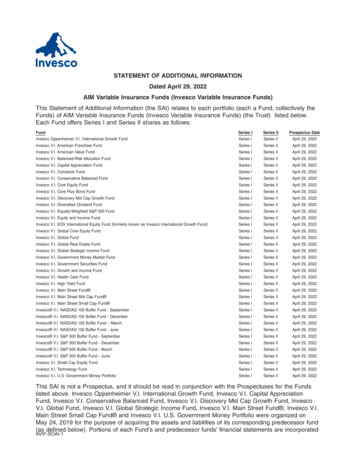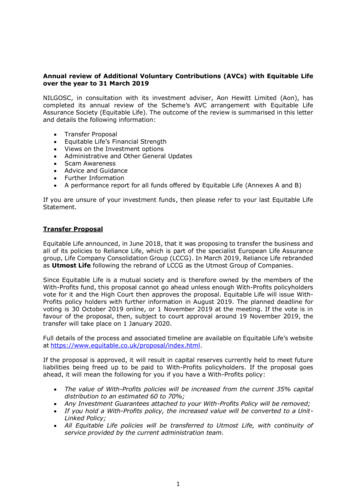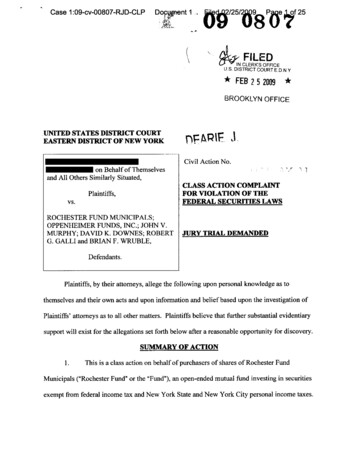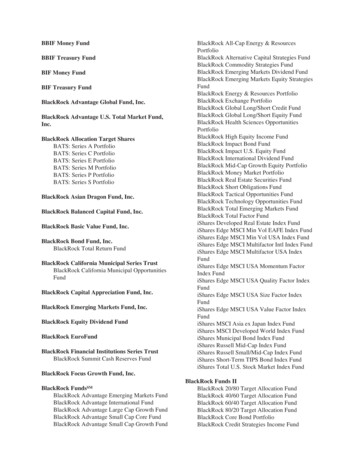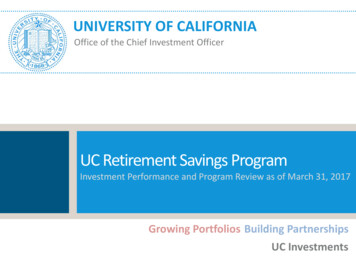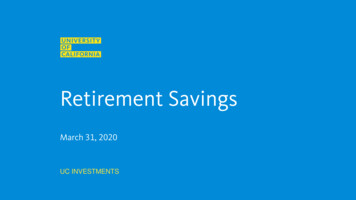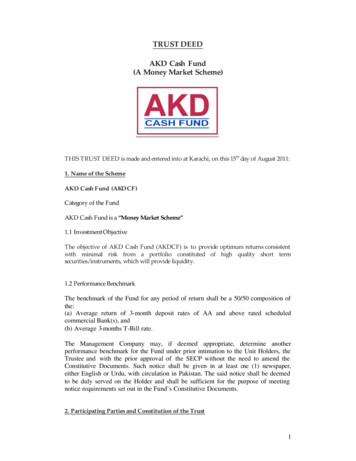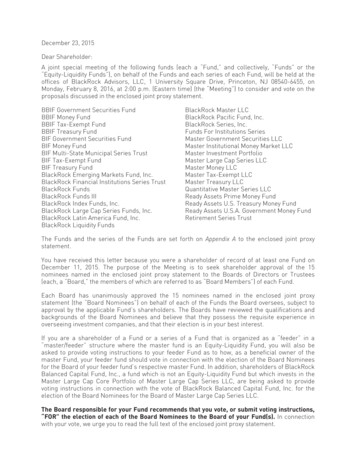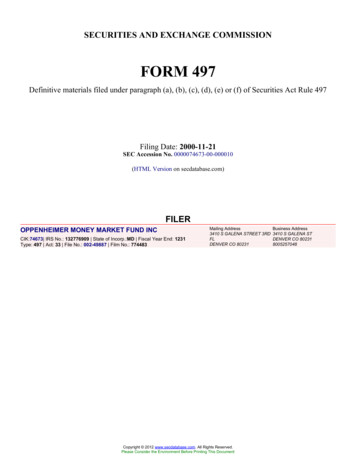
Transcription
SECURITIES AND EXCHANGE COMMISSIONFORM 497Definitive materials filed under paragraph (a), (b), (c), (d), (e) or (f) of Securities Act Rule 497Filing Date: 2000-11-21SEC Accession No. 0000074673-00-000010(HTML Version on secdatabase.com)FILEROPPENHEIMER MONEY MARKET FUND INCCIK:74673 IRS No.: 132776909 State of Incorp.:MD Fiscal Year End: 1231Type: 497 Act: 33 File No.: 002-49887 Film No.: 774483Mailing Address3410 S GALENA STREET 3RDFLDENVER CO 80231Copyright 2012 www.secdatabase.com. All Rights Reserved.Please Consider the Environment Before Printing This DocumentBusiness Address3410 S GALENA STDENVER CO 802318005257048
OppenheimerMoney Market Fund, Inc.Prospectus dated November 22, 2000Oppenheimer Money Market Fund, Inc. is a money market mutual fund. Its goal isto seek the maximum current income that is consistent with stability ofprincipal.The Fund invests in short-term,high-quality "money market"instruments. This Prospectus contains important information about the Fund'sobjective, its investment policies, strategies and risks. It also containsimportant information about how to buy and sell shares of the Fund and otheraccount features. Please read this Prospectus carefully before you invest andkeep it for future reference about your account.As with all mutual funds, the Securities and Exchange Commission has notapproved or disapproved the Fund's securities nor has it determined that thisProspectus is accurate or complete. It is a criminal offense to representotherwise.(OppenheimerFunds logo)CONTENTSABOUT THE FUNDThe Fund's Investment Objective and StrategiesMain Risks of Investing in the FundThe Fund's PerformanceFees and Expenses of the FundAbout the Fund's InvestmentsHow the Fund is ManagedABOUT YOUR ACCOUNTHow to Buy SharesSpecial Investor ServicesAccountLinkPhoneLinkOppenheimerFunds Internet Web SiteRetirement PlansHow to Sell SharesBy MailBy TelephoneBy CheckwritingHow to Exchange SharesShareholder Account Rules and PoliciesCopyright 2012 www.secdatabase.com. All Rights Reserved.Please Consider the Environment Before Printing This Document
Dividends and Tax InformationFinancial HighlightsABOUT THE FUNDThe Fund's Investment Objective and StrategiesWHAT IS THE FUND'S INVESTMENT OBJECTIVE? The Fund's objective is to seek themaximum current income that is consistent with stability of principal.WHAT DOES THE FUND INVEST IN? The Fund is a money market fund. It invests in avariety of high-quality money market instruments to seek income. Money marketinstruments are short-term debt instruments issued by the U.S. government,domestic and foreign corporations and financial institutions and other entities.They include, for example, bank obligations, repurchase agreements, commercialpaper, other corporate debt obligations and government debt obligations.To be considered "high-quality," generally they must be rated in one ofthe two highestcredit-qualitycategories for short-term securities bynationally-recognized rating services. If unrated, a security must be determinedby the Fund's investment manager to be of comparable quality to ratedsecurities.WHO IS THE FUND DESIGNED FOR? The Fund is designed for investors who want toearn income at current money market rates while preserving the value of theirinvestment, because the Fund tries to keep its share price stable at 1.00.Income on short-term securities tends to be lower than income on longer termdebt securities, so the Fund's yield will likely be lower than the yield onlonger-term fixed income funds. The Fund also offers easy access to your moneythrough checkwriting and wire redemption privileges. The Fund does not investfor the purpose of seeking capital appreciation or gains and is not a completeinvestment program.Main Risks of Investing in the FundAll investments carry risks to some degree. The Fund's investments are subjectto changes in their value from a number of factors, described below. There isalso the risk that the value of your investment could be eroded over time by theeffects of inflation and that poor security selection by the Fund's investmentManager, OppenheimerFunds, Inc., will cause the Fund to underperform other fundshaving similar objectives.There are risks that any of the Fund's holdings could have its creditrating downgraded, or the issuer could default, or that interest rates couldrise sharply, causing the value of the Fund's investments (and its share price)to fall. As a result, there is a risk that the Fund's shares could fall below 1.00 per share.An investment in the Fund is not insured or guaranteed by the FederalDeposit Insurance Corporation or any other government agency. Although the Fundseeks to preserve the value of your investment at 1.00 per share, it ispossible to lose money by investing in the Fund.The Fund's PerformanceThe bar chart and table below show one measure of the risks of investing in theFund by showing changes in the Fund's performance from year to year for the lastten calendar years and its average annual total returns for the 1-, 5- and 10year periods. Variability of returns is one measure of the risks of investing ina money market fund. The Fund's past investment performance does not predict howthe Fund will perform in the future.Annual Total Returns (% as of 12/31 each year)[See appendix to prospectus for annual total return data for bar chart.]Copyright 2012 www.secdatabase.com. All Rights Reserved.Please Consider the Environment Before Printing This Document
For the period from 1/1/00 through 9/30/00, the cumulative total return (notannualized) was 4.34%. During the period shown in the bar chart, the highestreturn (not annualized) for a calendar quarter was 1.96% (2nd Q'90) and thelowest return for a calendar quarter was 0.63% (1st Q'93).Average Annual TotalReturns for the periodsended December 31, 1999Oppenheimer MoneyMarket Fund, Inc.1 Year5 Years4.71%4.95%10 Years4.85%The returns measure the performance of a hypothetical account and assume thatall distributions have been reinvested in additional shares. The total returnsare not the Fund's current yield. The Fund's yield more closely reflects theFund's current earnings. To obtain the Fund's current 7-day yield information,please call the Transfer Agent toll-free at 1.800.525.7048.Fees and Expenses of the FundThe Fund pays a variety of expenses directly for investment management,administration and other services. Those expenses are subtracted from the Fund'sassets to calculate the Fund's net asset value per share. All shareholderstherefore pay those expenses indirectly. The following tables are meant to helpyou understand the fees and expenses you may pay if you buy and hold shares ofthe Fund. The numbers below are based upon the Fund's expenses during its fiscalyear ended July 31, 2000.Shareholder Fees. The Fund does not charge any initial sales charge to buyshares or to reinvest dividends. There are no exchange fees or redemption feesand no contingent deferred sales charges (unless you buy Fund shares byexchanging Class A shares of other Oppenheimer funds that were purchased subjectto a contingent deferred sales charge, as described in "How to Sell Shares").Annual Fund Operating Expenses (deducted from Fund assets):(% of average daily net assets)Management Fees0.42%Distribution (12b-1) FeesNoneOther Expenses0.36%Total Annual Operating Expenses0.78%"Other expenses" in the table include transfer agent fees,accounting and legal expenses the Fund pays.custodial fees, andEXAMPLE. The following example is intended to help you compare the cost ofinvesting in the Fund with the cost of investing in other mutual funds.The example assumes that you invest 10,000 in shares of the Fund for the timeperiods indicated and then redeem all of your shares at the end of thoseperiods. The example also assumes that your investment has a 5% return each yearand that the Fund's operating expenses remain the same. Your actual costs may behigher or lower, because expenses will vary over time. Based on theseassumptions your expenses would be as follows, whether or not you redeem yourinvestment at the end of each period:Copyright 2012 www.secdatabase.com. All Rights Reserved.Please Consider the Environment Before Printing This Document
1 Year 803 Years5 Years 24910 Years 433 966About the Fund's InvestmentsTHE FUND'S PRINCIPAL INVESTMENT POLICIES. The Fund invests in short-term moneymarket securities meeting quality standards established by its Board ofDirectors as well as rules that apply to money market funds under the InvestmentCompany Act. The Statement of Additional Information contains more detailedinformation about the Fund's investment policies and risks.The Manager tries to reduce risks by diversifying investments and bycarefully researching investments before they are purchased. The rate of theFund's income will vary from day to day, generally reflecting changes in overallshort-term interest rates. There is no assurance that the Fund will achieve itsinvestment objective.What Does the Fund Invest In? Money market instruments are high-quality,short-term debt instruments. They may have fixed, variable or floatinginterest rates. All of the Fund's money market investments must meetthe special quality and maturity requirements set under the InvestmentCompany Act and the special standards set by the Fund's Board,described briefly below. The following is a brief description of thetypes of money market securities the Fund may invest in.o U.S. Government Securities. These include obligations issued or guaranteed bythe U.S. Government or any of its agencies or instrumentalities. Some are directobligations of the U.S. Treasury, such as Treasury bills, notes and bonds, andare supported by the full faith and credit of the United States. Other U.S.government securities,such as pass-throughcertificates issued by theGovernment National Mortgage Association (Ginnie Mae), are also supported by thefull faith and credit of the U.S. government. Some government securitiesagencies or instrumentalities of the U.S. government are supported by the rightof the issuer to borrow from the U.S. Treasury, such as securities of FederalNational Mortgage Corporation (Fannie Mae). Others may be supported only by thecredit of the instrumentality, such as obligations of Federal Home Loan MortgageCorporation (Freddie Mac).o Bank Obligations. The Fund can buy time deposits, certificates of deposit andbankers' acceptances. These obligations must be denominated in U.S. dollars,even if issued by a foreign bank.o Commercial Paper. Commercial paper is a short-term, unsecured promissory noteof a domestic or foreign company or other financial firm. The Fund may buycommercial paper only if it matures in nine months or less from the date ofpurchase.o Corporate Debt Obligations. The Fund can invest in other short-term corporatedebt obligations, besides commercial paper, that at the time of purchase by theFund meets the Fund's quality standards, described below.o Other Money Market Obligations. The Fund may invest in money marketobligations other than those listed above if they are subject to repurchaseagreements or guaranteed as to their principal and interest by a corporationwhose commercial paper may be purchased by the Fund or by a domestic bank. Thebank must meet credit criteria set by the Fund's Board of Directors.Additionally, the Fund may buy other money market instruments that itsBoard ofDirectorsapprovesfromtime to time.They must be U.S.dollar-denominated short-term investments that the Board must determine to haveminimal credit risks.Currently, the Board has approved the purchase of dollar-denominatedobligations of foreign banks payable in the U.S. or in London, England, floatingor variable rate demand notes,asset-backed securities,and bank loanparticipation agreements. Their purchase may be subject to restrictions adoptedby the Board from time to time. That limitation does not apply to securitiesissued by foreign branches of U.S. banks.WHAT CREDITQUALITY ANDMATURITYSTANDARDSAPPLY TO THE FUND'SINVESTMENTS?Copyright 2012 www.secdatabase.com. All Rights Reserved.Please Consider the Environment Before Printing This Document
Money market instruments are subject to credit risk, the risk that the issuermight not make timely payments of interest on the security or repay principalwhen it is due. The Fund may buy only those investments that meet standards setby the Board of Directors and in the Investment Company Act for money marketfunds. The Fund's Board has adopted evaluation procedures for the Fund'sportfolio, and the Manager has the responsibility to implement those procedureswhen selecting investments for the Fund.In general, the Fund buys only high-quality investments that theManagerbelieves present minimal credit risk at the time of purchase."High-quality" investments are:o rated in one of the two highestrating organizations, orshort-termrating categories of two nationalo rated by one rating organization in one of its two highest rating(if only one rating organization has rated the investment), oro unrated investments that the Managerthe two highest rating categories.categoriesdetermines are comparable in quality toThe procedures also limit the amount of the Fund's assets that can beinvested in the securities of any one issuer (other than the U.S. government,its agencies and instrumentalities), to spread the Fund's investment risks. Asecurity's maturity must not exceed 397 days. Finally, the Fund must maintain anaverage portfolio maturity of not more than 90 days, to reduce interest raterisks.CAN THE FUND'S INVESTMENT OBJECTIVE AND POLICIES CHANGE? The Board of Directorsof the Fund may change non-fundamental policies without shareholder approval,although significant changes will be described in amendments to this Prospectus.Fundamental policies cannot be changed without the approval of a majority of theFund's outstanding voting shares. The Fund's investmentobjective is afundamental policy. Some investment restrictions that are fundamental policiesare listed in the Statement of Additional Information. An investment policy isnotfundamentalunless this Prospectus or the Statement of AdditionalInformation says that it is.OTHER INVESTMENT STRATEGIES. To seek its objective, the Fund can also use theinvestment techniques and strategies described below. The Fund might not alwaysuse all of them. These techniques involve risks, although some of them aredesigned to help reduce overall investment or market risks. The Statement ofAdditional Information contains more information about some of these practices.Floating Rate/Variable Rate Notes. The Fund can purchase notes with floating orvariable interest rates. Variable rates are adjustable at statedperiodic intervals. Floating rates are adjusted automatically accordingto a specified market rate or benchmark, such as the prime rate of abank. If the maturity of a note is greater than 397 days, it may bepurchased only if it has a demand feature. That feature must permit theFund to recover the principal amount of the note on not more thanthirty days' notice at any time, or at specified times not exceeding397 days from purchase.Obligations of Foreign Banks and Foreign Branches of U.S. Banks. The Fund caninvest in U.S. dollar-denominated securities of foreign banks that are payablein the U.S. or in London, England. It can also buy dollar-denominated securitiesof foreign branches of U.S. banks. These securities have investment risksdifferent from obligations of domestic branches of U.S. banks. Risks that mayaffect the bank's ability to pay its debt include: o political and economicdevelopments in the country in which the bank or branch is located, o impositionof withholding taxes on interest income payable on the securities, o seizure ornationalization of foreign deposits, o the establishment of exchange controlregulations and o the adoption of other governmental restrictions that mightaffect the payment of principal and interest on those securities.Additionally,not all of the U.S. and state banking laws andregulations that apply to domestic banks and that are designed to protectdepositors and investors apply to foreign branches of domestic banks. None ofthose U.S. and state regulations apply to foreign banks.Asset-Backed Securities. The Fund can invest in asset-backed investments. Theseare fractional interests in pools of consumer loans and other trade receivables,Copyright 2012 www.secdatabase.com. All Rights Reserved.Please Consider the Environment Before Printing This Document
which are the obligations of a number of different parties. The income from theunderlying pool is passed through to investors, such as the Fund.These investments might be supported by a credit enhancement, such as aletter of credit, a guarantee or a preference right. However, the creditenhancement generally applies only to a fraction of the security's value. If theissuer of the security has no security interest in the related collateral, thereis the risk that the Fund could lose money if the issuer defaults.Repurchase Agreements. The Fund may enter into repurchase agreements. In arepurchase transaction, the Fund buys a security and simultaneously sells it tothe vendor for delivery at a future date. Repurchase agreements must be fullycollateralized. However, if the vendor fails to pay the resale price on thedelivery date, the Fund may incur costs in disposing of the collateral and mayexperience losses if there is any delay in its ability to do so. There is nolimit on the amount of the Fund's net assets that may be subject to repurchaseagreements of 7 days or less.Illiquid and Restricted Securities. Investments may be illiquid because they donot have an active trading market, making it difficult to value them or disposeof them promptly at an acceptable price. A restricted security is one that has acontractual limit on resale or which cannot be sold publicly until it isregistered under federal securities laws. The Fund will not invest more than 10%of its net assets in illiquid or restricted securities. That limit does notapply to certain restricted securities that are eligible for resale to qualifiedinstitutional purchasers. The Manager monitors holdings of illiquid securitieson an ongoing basis to determine whether to sell any holdings to maintainadequate liquidity. Difficulty in selling a security may result in a loss to theFund or additional costs.How the Fund is ManagedTHE MANAGER. The Manager chooses the Fund's investments and handles itsday-to-day business. The Manager carries out its duties, subject to the policiesestablished by the Fund's Board of Directors, under an investment advisoryagreement which states the Manager's responsibilities. The agreement sets thefees the Fund pays to the Manager and describes the expenses that the Fund isresponsible to pay to conduct its business.The Manager has operated as an investment advisor since January 1960.The Manager (including subsidiaries and affiliates) managed more than 125billion in assets as of September 30, 2000, including investment companies,including other Oppenheimer funds with more than 5 million shareholder accounts.The Manager is located at Two World Trade Center, 34th Floor, New York, New York10048-0203.Portfolio Manager. Carol E. Wolf is the portfolio manager of the Fund. She isthe person principally responsible for the day-to-day management of the Fund'sportfolio. Ms. Wolf has had this responsibility since November 1988. Ms. Wolf isa Senior Vice President of the Manager, and is an officer and portfolio managerof other Oppenheimer funds.Advisory Fees. Under the Investment Advisory Agreement, the Fund pays theManager an advisory fee at an annual rate that declines on additional assets asthe Fund grows: 0.45% of the first 500 million of average annual net assets,0.425% of the next 500 million, 0.40% of the next 500 million, and 0.375% ofnet assets in excess of 1.5 billion. The Fund's management fee for the fiscalyear ended July 31, 2000 was 0.42% of the Fund's average annual net assets.About Your AccountHow Do You Buy SharesHOW DO YOU BUY SHARES? You can buy shares several ways, as described below. TheFund's Distributor, OppenheimerFunds Distributor, Inc., may appoint servicingagents to accept purchase (and redemption) orders. The Distributor, in its solediscretion, may reject any purchase order for the Fund's shares.The Fund intends to be as fully invested as possible to maximize its yield.Therefore, newly-purchased shares normally will begin to accrue dividends afterthe Distributor accepts your purchase order, starting on the business day afterthe Fund receives Federal Funds from your purchase payment. Buying SharesThrough Your Dealer. You can buy shares through any dealer, broker, or financialCopyright 2012 www.secdatabase.com. All Rights Reserved.Please Consider the Environment Before Printing This Document
institution that has a sales agreement with the Distributor.place your order with the Distributor on your behalf.Your dealer willo Guaranteed PaymentProcedures.Somebroker-dealers may havearrangements with the Distributor to enable them to place purchaseorders for shares on a regular business day and to guarantee that theFund's custodian bank will receive Federal Funds to pay for the sharesby 2:00 P.M. on the next regular business day. The shares will start toaccrue dividends starting on the day the Federal Funds are received by2:00 P.M.Buying Shares Through the Distributor. Complete an OppenheimerFunds New AccountApplication and return it with a check payable to "OppenheimerFunds Distributor,Inc." Mail it to P.O. Box 5270, Denver, Colorado 80217. Your check should be inU.S. dollars and drawn on a U.S. bank so that dividends will begin to accrue onthe next regular business day after the Distributor accepts your purchase order.If you don't list a dealer on the application, the Distributor will act as youragent in buying the shares. However, we recommend that you discuss yourinvestment with a financial advisor before you make a purchase to be sure thatthe Fund is appropriate for you.oPaying by FederalFunds Wire.Sharespurchasedthrough theDistributor may be paid for by Federal Funds wire. The minimuminvestment is 2,500. Before sending a wire, call the Distributor'sWire Department at 1.800.525.7048 to notify the Distributor of thewire, and to receive further instructions.o Buying Shares Through OppenheimerFunds AccountLink. With AccountLink,you pay for shares by electronic funds transfers from your bankaccount. Shares are purchased for your account by a transfer of moneyfrom your bank account through the Automated Clearing House (ACH)System. You can provide those instructions automatically, under anAsset Builder Plan, described below, or by telephone instructions usingOppenheimerFunds PhoneLink, also described below. Please refer to"AccountLink," below for more details. Dividends begin to accrue onshares purchased this way on the business day after the Fund receivesthe ACH payment from your bank.o Buying Shares Through Asset Builder Plans. You may purchase shares ofthe Fund (and up to four other Oppenheimer funds) automatically eachmonth from your account at a bank or other financial institution underan Asset Builder Plan with AccountLink. Details are in the AssetBuilder Application and the Statement of Additional Information.HOW MUCH MUST YOU INVEST? You can buy Fund shares with a minimum initialinvestment of 1,000 and make additional investments at any time with as littleas 25. There are reduced minimum investments under special investment plans.o With Asset Builder Plans, 403(b) plans, Automatic Exchange Plans andmilitaryallotmentplans, you can make initial and subsequentinvestments for as little as 25. You can make additional purchases ofat least 25 through AccountLink.o Under retirement plans, such as IRAs, pension and profit-sharingplans and 401(k) plans, you can start your account with as little as 250. Ifyour IRA is started under an Asset Builder Plan, the 25 minimum applies.Additional purchases may be as little as 25.o The minimum investment requirement does not apply to reinvestingdividends from the Fund or other Oppenheimer funds (a list of them appears inthe Statement of Additional Information, or you can ask your dealer or call theTransfer Agent), or reinvesting distributions from unit investment trusts thathave made arrangements with the Distributor.AT WHAT PRICE ARE SHARES SOLD? Shares are sold at their offering price, which isthe net asset value per share without any sales charge. The net asset value pershare will normally remain fixed at 1.00 per share. However, there is noguarantee that the Fund will maintain a stable net asset value of 1.00 pershare. The offering price that applies to a purchase order is based on the nextcalculation of the net asset value per share that is made after the Distributorreceives the purchase order at its offices in Colorado, or after any agentappointed by the Distributor receives the order and sends it to the Distributor.Copyright 2012 www.secdatabase.com. All Rights Reserved.Please Consider the Environment Before Printing This Document
Net Asset Value. The Fund calculates the net asset value of shares of the Fundeach day, at 4:00 P.M., on each day The New York Stock Exchange is open fortrading (referred to in this Prospectus as a "regular business day").All references to time in this Prospectus mean "New York Time."The net asset value per share is determined by dividing the value of theFund's net assets attributable to a class by the number of shares of that classthat are outstanding. Under a policy adopted by the Fund's Board of Directors,the Fund uses the amortized cost method to value its securities to determine netasset value. The Offering Price. To receive the offering price for a particularday, in most cases the Distributor or its designated agent must receive yourorder by the time of day The New York Stock Exchange closes that day. If yourorder is received on a day when the Exchange is closed or after it has closedthe order will receive the next offering price that is determined after yourorder is received.Buying Through a Dealer. If you buy shares through a dealer,your dealer must receive the order by the close of The New York Stock Exchangeand transmit it to the Distributor so that it is received before theDistributor's close of business on a regular business day (normally 5:00 P.M.)to receive that day's offering price. Otherwise, the order will receive thenext offering price that is determined.WHAT CLASS OF SHARES DOES THE FUND OFFER? The Fund offers investors one class ofshares. Those shares are considered to be Class A shares for the purposes ofexchanging them or reinvesting dividends among other Oppenheimer funds thatoffer more than one class of shares.Special Investor ServicesACCOUNTLINK. You can use our AccountLink feature to link your Fund account withan account at a U.S. bank or other financial institution. It must be anAutomated Clearing House (ACH) member. AccountLink lets you:o transmit funds electronically to purchase shares by telephone (through aservice representative or by PhoneLink) or automatically under Asset BuilderPlans, oro have the Transfer Agent send redemption proceeds or to transmit dividends anddistributions directly to your bank account. Please call the Transfer Agent formore information.You may purchase shares by telephone only after your account has beenestablished. To purchase shares in amounts up to 250,000 through a telephonerepresentative, call the Distributor at 1.800.852.8457. The purchase paymentwill be debited from your bank account.AccountLink privileges should be requested on your Application or yourdealer's settlement instructions if you buy your shares through a dealer. Afteryour account is established, you can request AccountLink privileges by sendingsignature-guaranteed instructions to the Transfer Agent. AccountLink privilegeswill apply to each shareholder listed in the registration on your account aswell as to your dealer representative of record unless and until the TransferAgent receives written instructions terminating or changing those privileges.After you establish AccountLink for your account, any change of bank accountinformation must be made by signature-guaranteed instructions to the TransferAgent signed by all shareholders who own the account.PHONELINK. PhoneLink is the OppenheimerFunds automated telephone system thatenables shareholders to perform a number of account transactions automaticallyusing a touch-tone phone. PhoneLink may be used on already-established Fundaccounts after you obtain a Personal Identification Number (PIN), by calling thespecial PhoneLink number, 1.800.533.3310.Purchasing Shares. You may purchase shares in amounts up to 100,000 by phone,by calling 1.800.533.3310. You must have established AccountLink privileges tolink your bank account with the Fund to pay for these purchases.Exchanging Shares. With the OppenheimerFundsExchange Privilege,described below, you can exchange shares automatically by phone from your FundCopyright 2012 www.secdatabase.com. All Rights Reserved.Please Consider the Environment Before Printing This Document
account to another Oppenheimer fundcalling the special PhoneLink number.account you have alreadyestablishedbySelling Shares. You can redeem shares by telephone automatically by callingthe PhoneLink number and the Fund will send the proceeds directly to yourAccountLink bank account. Please refer to "How to Sell Shares," below fordetails.CAN YOU SUBMIT TRANSACTION REQUESTS BY FAX? You may send requests for certaintypes of account transactions to the Transfer Agent by fax (telecopier). Pleasecall 1.800.525.7048 for information about which transactions may be handled thisway. Transaction requests submitted by fax are subject to the same rules andrestrictions as written and telephone requests described in this Prospe
Oppenheimer Money Market Fund, Inc. Prospectus dated November 22, 2000 Oppenheimer Money Market Fund, Inc. is a money market mutual fund. Its goal is to seek the maximum current income that is consistent with stability of principal. The Fund invests in short-term, high-quality "money market" instruments.

